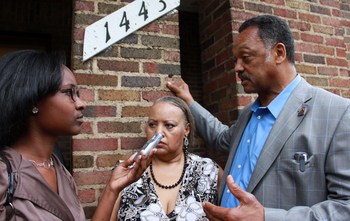One on one with the Rev. Jesse Jackson, legendary civil rights activist
On Monday, the Rev. Jesse Jackson spoke to a nearly full house at the William Monroe Trotter Multicultural Center at the University of Michigan, recalling his involvement in the civil rights movement and calling on students to take action from "stimulus bottom-up, as opposed to top-down."
"We must revive within America a really serious student movement," he said.
Before his campus visit, as part of the weeklong "Rebuild America: Jobs, Justice & Peace" tour, Jackson wanted to speak to a student to engage the university community. Jackson wanted a student voice to deliver his call to action for student activism. Because of my interest in social equality as a contributing writer and former Michigan Daily columnist, I was referred by Erica Williams, community development program manager of the Office of Multi-Ethnic Student Affairs, to speak privately with Jackson.

The Rev. Jesse Jackson wanted a student voice to deliver his call to action for student activism during his visit earlier this week to the University of Michigan.
Photo by Alden Spraggins
Going into the interview, I had my preconceived notions —some critical— of the controversial civil rights activist.
But after talking with him, I walked away with a better understanding of Jackson; in fact, his words resonated with me. The way in which Jackson speaks of the concerns of the day, such as the War on Terror, the loss of manufacturing jobs, and the rising price tag of higher education, is fueled not by an anxiety to complain, but with the invigoration of a liberator for change.
While my talk with Rev. Jackson only lasted 30 minutes, the impact of his message was everlasting. He spoke to me about the urgency of my generation to act as the generation of our parents. He challenged my generation to not be “color-blind, but color-care,” meaning to recognize the complexities in which this country is interwoven and to appreciate and be respectful of that which distinguishes us from each other.
When I arrived at the Trotter Multicultural Center to speak with the civil rights activist, I was prepared to speak to him about the intent of this campaign. However, given the time that Jackson had to spend responding to an impromptu phone call, my interview with Jackson had been re-arranged to a phone interview during his bus tour later that evening. During his weeklong bus tour around the State of Michigan he is promoting the three fundamental elements that he feels is needed for the state of Michigan to live up to the promise of its ideals: jobs, justice, and peace.
The content of my interview with Jackson was filled with questions about his role in the black community, the positioning of student activism in realigning this country with its values, and the regional purpose of his visit. Jackson exhibited charm and lighthearted humor but was also serious in answering my questions.
The emotions that I felt while listening to Jackson speak to today’s social and economic disorder was as illuminating as his oratory.
The personal time that I spent with Jackson was similar to the feeling that I continue to feel every time that I listen to Dr. Martin Luther King Jr’s I Have A Dream Speech. The sensation that moves through my body when I hear King speak is similar to the exciting feeling that I get when I hear President John F. Kennedy communicate what King called “the urgency of now…to make justice a reality.”
This moving feeling is one that I experience as I become energized by the vivid images that Jackson, King and Kennedy paint as they speak so descriptively of the type of world that we can live in, if we, as a global community work toward transitioning from the world that it is, toward the potential that it can become.
Despite the criticism and my own misjudgments of Jackson going into my interview with him, I left him walking away believing that Jackson is not trying to perpetuate a racial stalemate.
I went to the Trotter Multicultural Center expecting to hear Jackson rejoice and nurture the black nationalistic spirit. Instead, I learned my expectations of Jackson were enormously restrictive. Suddenly, I understood why Jackson is named a civil rights leader. He doesn’t stand on the aisle that separates black from white, but on the aisle that divides right from wrong.

